- Home
- Tony Hillerman
The Blessing Way Page 8
The Blessing Way Read online
Page 8
A whippoorwill sounded its whistling call far down the canyon and was answered by an echo. And then it was eerily silent.
Directly overhead McKee picked out the stars of the Pleiades—six in two parallel rows and the seventh trailing to close the double line. From these, McKee remembered, the seven Hard Flint Boys of the Navajo myth had descended to follow Monster Slayer on his heroic odyssey among the evil things. And to spread their own mischief among the Dinee. And to receive ceremonial offerings of cornmeal every spring from a thousand sheepherders in a thousand little sacred shrines on a thousand mesas and mountains across the Reservation. McKee located two stars, each surrounded by the hazy light of a nebula, which represented the Hard Flint Woman and a contestant in the Bounding Stick Game. He couldn’t dredge up the name of the other Holy Person but he vaguely remembered that in the myth there was an argument over the outcome and a solution based on the trickery so inevitable in both Greek and Navajo myth. Far up the west rim of the canyon, a coyote yipped twice, and then poured out its soul in a full-throated bay. The sound seemed to float down from the stars, the voice of some primeval hound drifting infinite sorrow across the sky.
It might be my coyote, McKee thought, the one that got into Yazzie’s ram pen. He would go back tomorrow to find out how, if his guide duties with Miss Leon allowed. He shifted his weight on the packed sand and felt suddenly less sure that he would find any way a coyote could have invaded that tight little enclosure. In this silent darkness mystery seemed suddenly natural, almost rational. Down the canyon the whippoorwill called again and then there was the odd, rasping cry of a saw-whet owl, sounding, McKee thought, like an ogre filing off his chains. He reached for his cigarette pack, decided against it, and thought again of the note Canfield had left, and why Jeremy Robert Canfield, whose first name was part of a private anthropology faculty joke, would sign “John” to this note. He drifted uneasily on the margin of sleep.
The sound jerked him abruptly up from the blankets, wide awake, staring across the canyon. It had been the clatter of a falling pebble, bouncing down the eroded cliff and dislodging a small shower of other pebbles. The residue of faint echoes lingered a second in the stillness and then faded. McKee sat stock-still, listening, feeling the tenseness of muscle fiber flooded with adrenalin and the taste of primitive fear in his mouth. He slid his legs out of the bedroll and slipped them into his trousers, put on his boots, picked up his shirt, and stood. The moon had risen halfway up the sky and the west wall of the canyon was flooded now with pale light. McKee stood in a rigid crouch, listening, studying the worn outcroppings of sandstone from which the sound had come. There was nothing but the silence. A sinister shape half hidden by juniper at the foot of the outcrop became, as McKee’s eyes better adjusted to the half light, an oddly eroded boulder. McKee relaxed slightly, feeling the panic leaving him. It could have been an animal. And, as he thought this, it seemed ridiculous to think it could be anything but an animal—perhaps a night-prowling porcupine. He stood there, feeling suddenly slightly weak and very foolish. But still there was something primitive within his mind signaling danger and urging caution. Five black rams with bloody throats and the wrong name signed to a simple note. A burrowing owl glided slowly down the moonlit side of the canyon floor, scouting for night-feeding kangaroo rats. It swerved suddenly away from the outcrop, flapped its wings wildly, and disappeared in the darkness down canyon from McKee. And, as it disappeared, his fear returned. Something had startled the owl. It would not have been frightened by anything small.
He moved cautiously away from the bedroll, farther back into the darkness up the talus slope toward the east cliff, taking each step carefully, climbing slowly over the smaller boulders, carefully skirting the larger ones. In a pocket of water-cut rock directly under the overhanging cliff he stopped and turned back to look behind him, surprised that he was panting from the brief exertion and fighting to keep his breathing silent.
The light of the climbing moon had moved halfway across the canyon floor. Nothing stirred. The canyon was a crevice of immense, motionless, brooding quiet. McKee studied the outcropping carefully, shifted his eyes slowly down canyon, examining every shape under the flat, yellow light, and then examining every shadow. He felt the rough surface of the rock cutting into his knees and started to shift his weight, but again there was the primal urging to caution. It was then he caught the motion.
Something in the black shadow behind the outcrop had moved slightly. McKee stared until his eyes burned, rubbed them, and then stared again. And he saw the dog’s head. It inched slowly out of the shadow into the moonlight. First a muzzle and then the head, its ears upright and—McKee strained his eyes until he was sure—its mouth hanging unnaturally open. The head remained there, motionless. McKee stared, every muscle rigid. The dog’s head seemed unnaturally high—unless, McKee thought, it was standing on some sort of ledge behind the outcropping. And then there was motion again.
The dog became a man. A large man with the skin of a wolf over his shoulders, its empty skull atop his own head. He moved across a patch of moonlight and disappeared behind a growth of bushes at a foot of the west cliff talus. When the shape reappeared a moment later, McKee thought for a split second that his eyes had been deceiving him—that it actually was a wolf. But it was a man, running in a crouch across the damp sand of the canyon bottom, running with silent swiftness directly toward McKee’s tent. The man held something in his right hand, something perhaps a foot long, metal which reflected the moonlight. It was a long-barreled pistol, with an ammunition clip jutting down in front of the trigger. A machine pistol.
The shape disappeared again, out of sight behind the talus slope on McKee’s side of the canyon. McKee bent and felt around his feet for a rock, selected one about the size of a softball. When he raised his head, the figure was back in view—in the shadow but silhouetted now against the moonlit cliff. McKee gripped the stone and watched. The panic was gone now, replaced by a kind of grim anger. The figure was at the tent, standing motionless. Listening, McKee thought. Listening and not hearing a damned thing and wondering about it. Then the shape was gone, out of sight behind the tent. McKee had almost decided the man had somehow slipped away when he saw him again, by the bedrolls now, but brush and boulders obscured the area and he couldn’t see what the man was doing. He studied the cliff wall on both sides of his pocket. He could climb out of this sheltered place by working his way past a huge block of sandstone just beside him. He could probably make his way down canyon without being in view from the camp.
But if he comes this way, McKee thought, this might be the best place to face him. I could probably knock him down with my rock before he saw me. Unless he has a flashlight as well as the gun. Then there wouldn’t be much chance.
And, while he thought this, the utter irrationality of it all occurred to him. It was unreal. Like some crazy childhood nightmare.
But the man was there, real enough, back by the tent now and no longer seeming to make any effort at concealment. He raised the hood of McKee’s truck and McKee had a sudden wild hope that he would start it, climb in, and race away, nothing more than a thief. Instead, he closed the hood and walked back and into the tent. A moment later a spot of light showed through the canvas. The flashlight beam shifted, held steady, shifted again, and then stopped. He’s looking through my papers, McKee thought. He wondered what the man would make of his notes on the witchcraft interviews. And he had a sudden impulse to walk into the tent, confront the man, and demand to know what the devil he was doing. Then the light snapped off and the man appeared again in front of the tent, staring almost directly toward McKee’s hiding place. McKee felt the impulse die.
“Doctor McKee?”
The man called in an even, sonorous voice, not much above a conversational tone. But in the stillness the sound seemed obscenely loud. And the canyon walls said “Kee-Kee-Kee” in a receding echo of his name.
“Bergen McKee,” the voice repeated. “I need to…” The echoes drowned the
rest of it. “I need to talk to you about Doctor Canfield,” the voice said. And the man stood silent until the echoes died again. Who is he? McKee wondered. The Navajo bitten by the snake? Or was this man a Navajo? He couldn’t tell anything from the voice. There was no trace of accent. But then educated Navajos rarely had accents, except for sometimes dropping the “th” sound.
The man stood silent a long moment, staring up, and then down, the canyon. Listening. And he won’t hear a damn thing, McKee thought. Not from me.
“John’s hurt,” the voice said. The voice was louder now and the cliffs bounced the “hurt” between them until it blended into a single note. “He needs help.”
John. John, not Jeremy. The man standing down there in the darkness, the man with the wolf skin, the man who had stalked like an animal, had some connection with Canfield’s note, with Canfield’s peculiar signature.
“I should go down there,” McKee thought, but he remembered the thing that had reflected the moonlight in this man’s hand as he had crossed the canyon floor. Why the pistol? Why the dog skin? And he leaned motionless against the boulder, feeling the rough coldness of the rock against his legs and the cold sweat on his palms, knowing he would go nowhere near this man. Not alone in this dark canyon. Not without a weapon.
And then the man was gone. Suddenly he was no longer beside the tent. And then McKee saw him, trotting diagonally across the canyon bottom, the wolf skin dangling from one hand. McKee relaxed against the boulder, suddenly aware that he was cold and that his shirt was wet with sweat. Far down canyon the saw-whet owl made its strange, rasping cry. Signaling a kill, McKee thought.
> 12 <
IT WAS WELL after midnight when Leaphorn finally learned who had collected the scalp for the ceremonial. He had talked until he was tired of talking—tired and frustrated and irritated at his close-mouthed people. And then a girl had told him, proudly and without prompting, that Billy Nez—whom he still hadn’t located—had stolen the hat. Billy Nez had tracked the truck of the witch and had watched from hiding until he finally had the opportunity. Leaphorn had been captured by the girl, a plump and pretty youngster wearing a T-shirt with “Chinle High School” printed across it, during the Girl Dance. She had grabbed his arm while he was talking to an old man.
“Come on, Blue Policeman,” she had said. “I’ve got you and you’ve got to dance.” And Leaphorn had let her tow him to the great fire, because he had already decided the old man would tell him nothing, and because it was the tradition at this ceremonial. He would dance with the girl a little, and after a while he would pay her the proper ransom for his release, and then he would continue wandering through the crowd asking for Billy Nez but no longer really expecting to find him here.
Blue Policeman, he thought. A hell of a lot of good it does to leave your uniform at home. There’s not an adult at this Sing by now who doesn’t know I’m the law.
The chant rose in the firelight. Ya Ha He Ya Na He. Rising and falling with the rhythm of the pot drums. And then the words. “Lie closer to me,” the singers chanted. “Bring your sheepskin and we will go into the darkness. What are you going to do out there?” Leaphorn glanced at his partner, curious whether the ribald suggestion of the song would embarrass a boarding-school girl. She danced gracefully, gripping his left arm with her right.
“I wonder why Hosteen Policeman looks at me,” she said. “Are you going to arrest me?”
Leaphorn returned the smile. “I would if I thought you could tell me anything.”
“Who are you after? What do you want to know?”
“I’d like to know all about a witch,” Leaphorn said.
“I’ll bet you don’t even believe in witches.”
“I believe in a witch who used to wear a big black Stetson hat until somebody got it away from him.”
“That was Billy Nez,” the girl had said. There it was, as simple as that. Billy Nez was around here somewhere (the girl glanced over her shoulder into the darkness, frowning).
“I’d like to talk to Hosteen Nez,” Leaphorn said.
“So would I. I caught him and made him dance and he just paid me twenty-five cents. And he said he’d let me catch him again.” The girl frowned into the darkness again and then looked up at Leaphorn. “But he’s no Hosteen yet. He’s just a boy.”
“How old is just a boy? “
“He’s just sixteen.”
And you’re about fifteen, Leaphorn thought, and if Billy Nez isn’t careful his clan is going to lose itself a boy, and a bride’s price to boot.
“Just a boy,” Leaphorn said.
“But he’s the one who got the hat. Billy was the Scalp Carrier. He followed That man’s pickup, and he watched from where the witch couldn’t see him, and when he went away Billy was the one who got the scalp.”
And that seemed to be exactly all the girl knew about it. She knew Nez was Red Forehead, and that he raised sheep with his uncle over on Cottonwood Flats near Chinle, and that he was wearing a red-checked shirt and a red baseball cap, and some of the other things that fifteen-year-old girls learn about sixteen-year-old boys. And then suddenly the pot drums and the chanting stopped, and there were much haggling and laughing and banter as the women collected their ransom fees. Leaphorn gave the girl a dollar.
“That’s the most I got all night,” she said. But she wouldn’t come with him to point out Nez.
Leaphorn spotted the Carrier of the Scalp a half hour later. The Sway Dancing had started then and he saw Nez in his ball cap among the line of dancers from the Stick Receiver’s camp. The rhythm was faster now and the rising, falling sound of the voices was as old as the earth. But the words were about a rocket.
“Belacani’s rocket fell on the mesa,” the singers chanted.
And then the line of men from the patient’s camp began the rhythmic swaying and the words changed.
“Belacani’s rocket start the brush burning.”
Track down the man who started that one, Leaphorn thought, and you’d find the missile the Army spent half the winter looking for four years ago. Trouble was it would be easier to find the missile than the song writer.
But he had, at least, found Billy Nez, and now the dancing was over for a time and Nez was walking toward him, talking to a younger boy who, Leaphorn guessed, would be his cousin.
“My nephew,” Leaphorn said, “I would like to talk for a moment with the man who carried the scalp.”
Billy Nez looked surprised and pleased. But, Leaphorn noticed, he also moved his hand toward his shirt front to touch his medicine pouch with its gallstone proof against witches. One was careful of strangers at an Enemy Way.
“I myself am a policeman,” Leaphorn said. “It is sometimes my business to track people and it would be good for me to hear how you tracked this Wolf.”
The boy looked down. “It was nothing very much,” he said. And then, remembering his manners, added, “My uncle.” For the first time in a long day, Leaphorn felt he was handling someone exactly right.
“And yet nobody else got the scalp for this Sing. It was you, Hosteen Nez.”
“Billy tracked him three days,” the younger boy said. He grinned at Leaphorn. “I’m Billy’s uncle’s son.”
“We might sit here by this pickup and smoke,” Leaphorn said. He took a cigarette and handed the pack to the younger boy. And when the pack came to Billy Nez he took a cigarette, and lit it, and told Joe Leaphorn everything he knew. And he started, as Leaphorn knew he would start, from the beginning.
The witch had first come around the summer hogans of his uncle at mid-spring not long after his uncle’s family had driven the sheep up from the winter grazing in the Chinle Valley to the summer range in the Lukachukais.
Two days after they had settled down, he and the two boys were driving the sheep up there on the plateau. His uncle was driving his own sheep and the boys were driving his uncle’s wife’s sheep. And they saw this truck coming across this arroyo there. It wasn’t really a truck. More like a jeep, only bigger
and with a cloth top on it.
“Was it a Land-Rover?” Leaphorn said.
“I don’t know,” Billy Nez said. “I never saw another one like it. It was gray.”
The Big Navajo had left Shoemaker’s store in a Land-Rover, Leaphorn thought. Gray and hard to see and I wonder if that’s a coincidence.
The truck had stopped at first and his uncle had seen the driver looking at them. And then it drove up and the man asked my uncle where he was taking those sheep and how long he was going to keep them in that high country. His uncle had said all summer and the man had asked if he didn’t know there was a witch cave up in that country and a bunch of wolves up there that got after people that came into their territory.
Billy Nez took a long drag on his cigarette, inhaled, and then blew out the smoke.
“What’d your uncle say?” Leaphorn asked, and was instantly irked with himself for his impatience.
“He thought it was kind of funny this Nakai knowing so much about Navajo Wolves.”
Leaphorn looked at Billy Nez sharply.
“Why Nakai? Did your uncle think this man was a Mexican?”
“Mexican, or Belacana, or something,” Billy Nez said. “Anyhow my uncle said he didn’t talk much good Navajo. Wanted to talk in English and my uncle don’t talk that much, so he tried to talk in Spanish and this man didn’t know that good.” Billy Nez paused. “So I guess he wasn’t a Nakai, come to think of it. Maybe a Ute or something.”

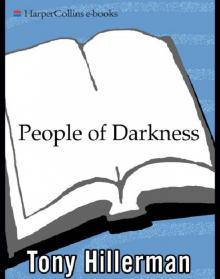 People of Darkness
People of Darkness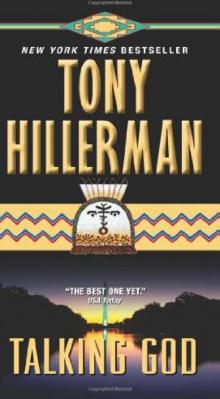 Talking God jlajc-9
Talking God jlajc-9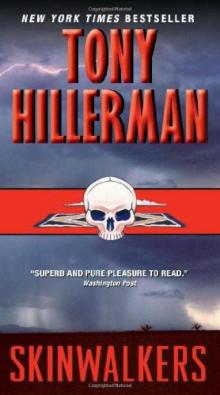 Skinwalkers jlajc-7
Skinwalkers jlajc-7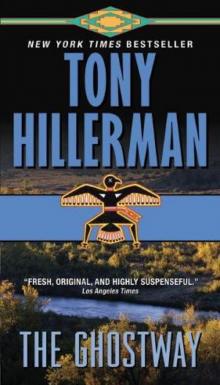 The Ghostway jlajc-6
The Ghostway jlajc-6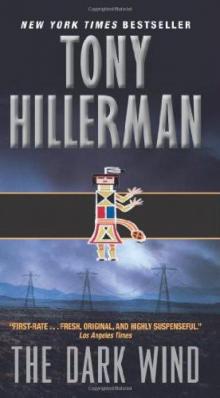 The Dark Wind jlajc-5
The Dark Wind jlajc-5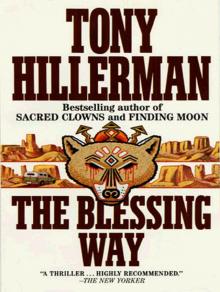 The Blessing Way
The Blessing Way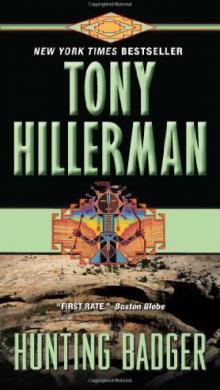 Hunting Badger jlajc-14
Hunting Badger jlajc-14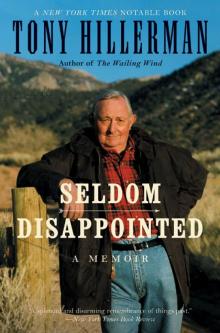 Seldom Disappointed: A Memoir
Seldom Disappointed: A Memoir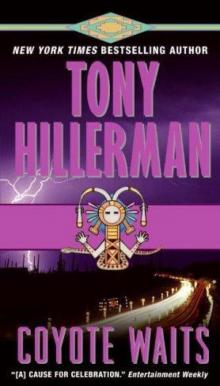 Coyote Waits jlajc-10
Coyote Waits jlajc-10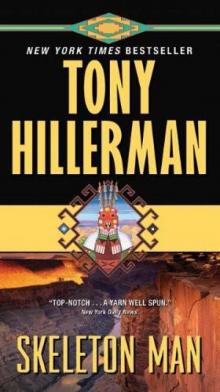 Skeleton Man jlajc-17
Skeleton Man jlajc-17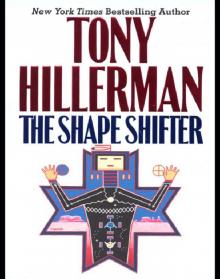 The Shape Shifter
The Shape Shifter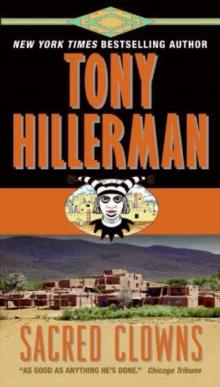 Sacred Clowns jlajc-11
Sacred Clowns jlajc-11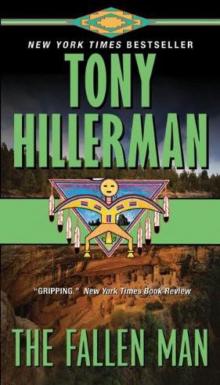 The Fallen Man jlajc-12
The Fallen Man jlajc-12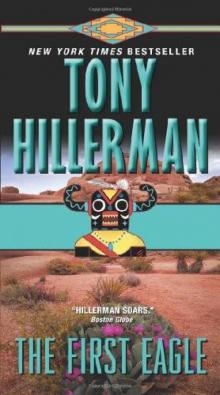 The First Eagle jlajc-13
The First Eagle jlajc-13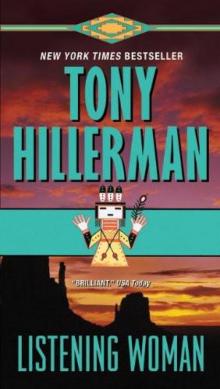 Listening Woman jlajc-3
Listening Woman jlajc-3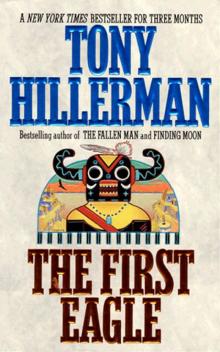 The First Eagle
The First Eagle Skeleton Man
Skeleton Man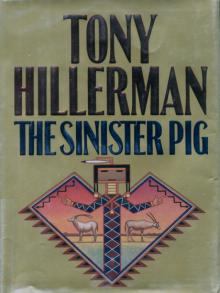 The Sinister Pig jlajc-16
The Sinister Pig jlajc-16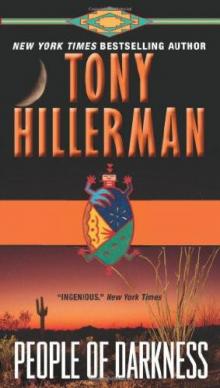 People of Darkness jlajc-4
People of Darkness jlajc-4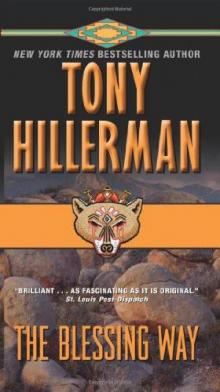 The Blessing Way jlajc-1
The Blessing Way jlajc-1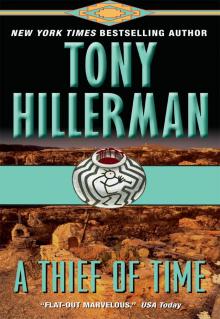 A Thief of Time
A Thief of Time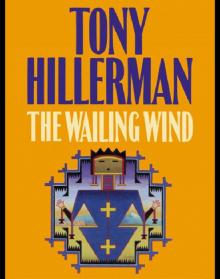 The Wailing Wind
The Wailing Wind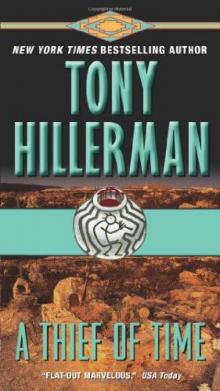 A Thief of Time jlajc-8
A Thief of Time jlajc-8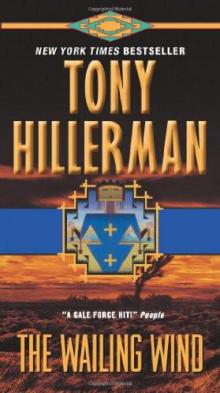 The Wailing Wind jlajc-15
The Wailing Wind jlajc-15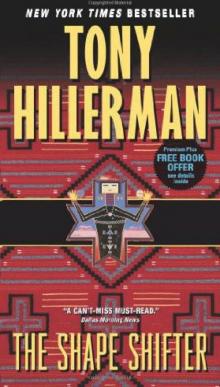 The Shape Shifter jlajc-18
The Shape Shifter jlajc-18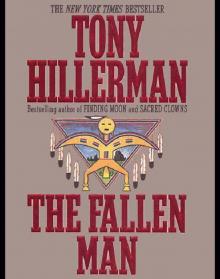 The Fallen Man
The Fallen Man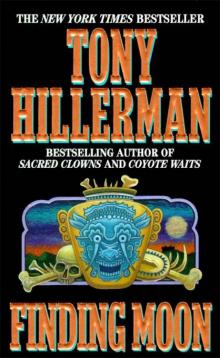 Finding Moon
Finding Moon